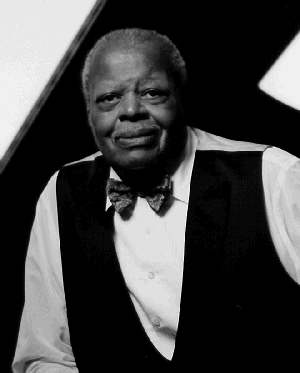
Year Born: 1925
Year Died: 2007
Year of Induction: 2004
Member of CAB Hall of Fame
Peterson, Oscar (1925-2007)
The legend has it that jazz impresario Norman Granz first heard the then 22-year-old Oscar Peterson in 1947 on a live broadcast on CJAD radio from Montreal’s Alberta Lounge. It is said that Granz, who was on the way to Dorval Airport, got the cab to turn around, went to the club, and immediately booked Oscar to play with the Jazz At The Philharmonic group at Carnegie Hall. True or not, the fact is that Granz did book Oscar to play at Carnegie Hall with JATP in September 1949, and it was Granz who paved the way for the Canadian piano genius to become world famous through scores of recordings, concerts and broadcasts.
Born in Montreal in August 1925, Oscar was first taught piano by his sister Daisy, and later by Louis Hooper and Paul de Marky. While in high school he played piano with the Montreal High School dance band (alongside Canadian future trumpet star Maynard Ferguson).
With sister Daisy’s encouragement, he appeared on Ken Soble’s CBC Radio talent show, where he won the top prize of $250. Later broadcasting gigs included a weekly fifteen-minute spot on Montreal’s CKAC radio, local appearances on CBC’s CBM in Montreal, and, later, national exposure on The Happy Gang on the CBC.
While Oscar had recorded for RCA Victor in Montreal in the mid-to-late 1940s, it was when his brilliant piano playing began to be featured on Granz’s Verve record label, and he toured with JATP jazz giants like Dizzy Gillespie, Coleman Hawkins, Ella Fitzgerald and Ray Brown, that his career really took off. Whether performing as soloist, sideman or accompanist, Oscar’s exceptional keyboard technique and consummate artistry earned him worldwide acclaim, and he made well over 130 albums and CDs.
His many compositions included Hymn To Freedom, The Canadiana Suite, The African Suite, A Royal Wedding Suite, and Trail of Dreams: A Canadian Suite, which he completed in 2000 at the age of 75. He also influenced the course of Canadian jazz music as a teacher, having included Brian Brown, Bill King and Wray Downes among his pupils, as well as teaching occasionally in the late 1980s at York University, of which he was Chancellor from 1991 to 1994.
Oscar was made an Officer of the Order Of Canada in 1972, and was promoted to be a Companion of the Order in 1984. He was inducted into the Canadian Music Hall of Fame in 1978, and won several Grammys for his recording work, as well as receiving a Grammy Award for Lifetime Achievement. He received several Junos, a George Peabody Medal in 1987, and the Glenn Gould Prize in 1993.
Despite a slight stroke in 1993, which limited the use of his left hand, Oscar continued to perform for many more years with such mastery of his instrument that few hearing him noticed any difference. He continued to be active in jazz education, and as an advocate for racial equality.
In 2004 he became the eighth member in the CAB Hall of Fame Canadian Music Star category. In January 2006, the International Association for Jazz Education (IAJE) announced the creation of the Dr. Oscar Peterson/Verve Canada Scholarship Award for Canadian jazz students.
Oscar Peterson died in December 2007 at age 82, in Mississauga, Ontario, less than three weeks before he was honoured jointly by the Canada Council for the Arts and the National Endowment for the Arts, at the IAJE’S Annual Conference in Toronto on January 11th 2008.
On November 17th 2008, The Society of Composers, Authors and Music Publishers of Canada (SOCAN) gave a posthumous Special Achievement Award to Oscar Peterson during its 19th annual Awards Ceremony.
Written by Pip Wedge – December, 2007
